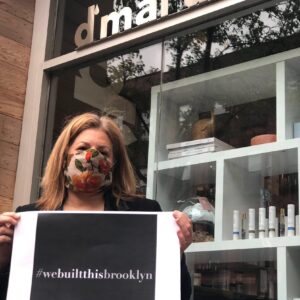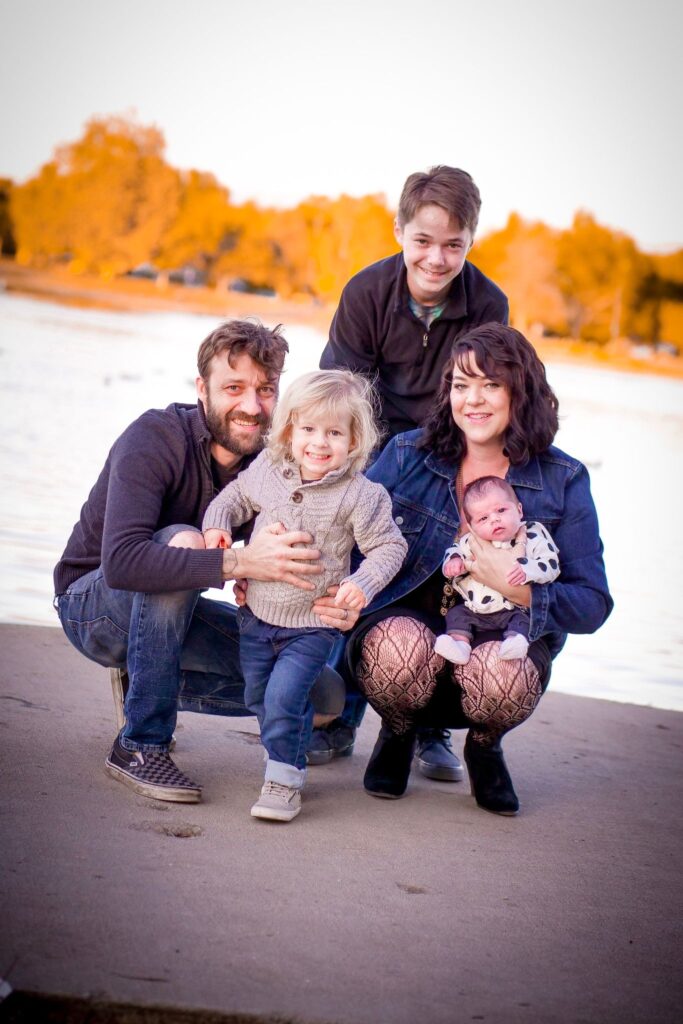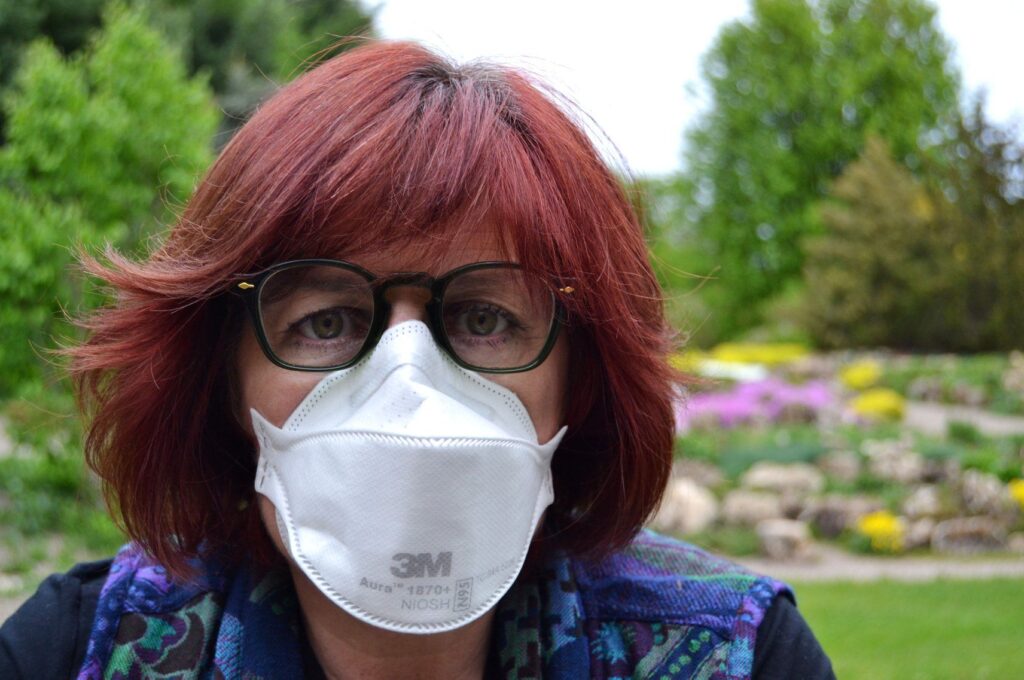American View
Feature
Covid’s Collateral Damage: Women
The Covid-19 pandemic has upended the world of most Americans, bringing devastating losses of friends and family, of livelihood and career. For Jewish women, like all American women, the pandemic has been compounded by the reality that they are shouldering enormous burdens, often beyond those of men.

Women like Daniella Stromberg, 55, who lost her spa in the Park Slope section of Brooklyn in the fall, after coronavirus restrictions had forced her to close the shop for months. Ultimately, after bringing in no income while simultaneously paying monthly rent checks of close to $30,000, she had to declare bankruptcy.
Kristen Joseff, 38, has been struggling with the stress of managing both her family’s costume jewelry business in Burbank, Calif., and the educational and emotional needs of her three children. The pandemic is straining not only her ability to work and to mother, but also how to communicate with her husband.
Covid has fundamentally changed the way Dr. Vivian Fischer, a family medicine physician in Minneapolis, provides care to her patients. It is also making it nearly impossible for the recently divorced 59-year-old to date. Meanwhile, her two teenage sons, who both have mental health issues, are learning remotely from home. As challenging as that is for any mother, the pandemic “has brought it to DEFCON 1,” she says.
And the pandemic has made it almost impossible for recent college graduates like Melanie Berman, 24, a New Jersey native, to find work—in her case, as an opera singer. While she is experimenting with other ways to get her name out there and make a few bucks, none of it adds up to earning a living or pursuing her lifelong dream.

According to research released last summer by the international consulting firm McKinsey & Company, 54 percent of jobs lost around the world due to Covid have belonged to women, though they claim only 39 percent of jobs. The discrepancy, according to the data, is due to the gendered nature of industry: Women are more likely to fill positions in the sectors of accommodation and food service, wholesale and retail trade, which have been hit harder by the Covid-related economic downturn than male-dominated sectors, such as business, real estate, forestry, agriculture and fishing.
Furthermore, McKinsey’s annual “Women in the Workplace” survey of corporate America, conducted in collaboration with Lean In, makes clear that in the age of Covid, the burden on working mothers has been greater than it usually is. The report, released in September, found that during this period, working mothers “are more than three times as likely as fathers to be responsible for most of the housework and caregiving. In fact, they’re 1.5 times more likely than fathers to be spending an extra three or more hours a day on housework and child care—equivalent to 20 hours a week, or half a full-time job.” The additional stress of child care while juggling work at home and remote learning for their children is a primary reason, according to the survey, that “1 in 4 women are contemplating what many would have considered unthinkable less than a year ago: downshifting their careers or leaving the workforce.”
“When you look at women at work and at home, there’s a good reason that this is being called a ‘she-cession,’ ” says Jean Chatzky, 56, a well-known personal finance columnist and CEO of HerMoney.com, a digital media company that aims to improve women’s relationship with money. “Recent research focuses on the impact of additional caregiving responsibilities on women and points to the fact that women have gotten slammed.”
In September 2020 alone, the same month that Stromberg had to close her spa, 865,000 American women aged 20 and older left the workforce, compared with 216,000 men, according to a National Women’s Law Center analysis of Labor Department data. Indeed, Stromberg was forced to lay off her entire 38-person staff.
As the mounting pandemic research suggests, there are inescapable disparities for women who would otherwise like to continue working.
“The reason more women are leaving the workforce is that they’re caring for their children or have realized their male partner is making more money, so it makes more sense for them to stay home,” says Jennifer Klein, chief strategy and policy officer at Time’s Up, a nonprofit organization focused on creating safe workplaces for women. “As a result, it’s a completely untenable situation for many women.”

Joseff, the California businesswoman, knows just how untenable it is. Joseff and her husband, Jeffrey, manage his family’s Joseff of Hollywood, a nearly 100-year-old costume jewelry manufacturer that has contributed pieces to iconic movies such as Gone With the Wind, The Wizard of Oz and, more recently, Westworld.
She is also the mother of three children, aged 15, 3 and 1, and the older two have special needs. The speech and occupational therapists who used to travel to her 3-year-old son’s preschool or home now only see him virtually—and Joseff must be there to supervise.
“The sessions are in the middle of my workday, which is frustrating,” she says. Meanwhile, her son is “feeling the effects of staying home more than the rest of us: tantrums, slightly aggressive behavior. When he wasn’t at school, we were out doing things all the time” at local attractions where he could run around. But now those spaces are closed. “When you have a child with a sensory impairment, they get sensory-seeking in other areas. Without the outlets to have all the running and climbing, his behavior becomes dysregulated.”
Her 15-year-old son, who is on the autism spectrum, gets anxious when Joseff is working. “He’ll start panicking if I don’t get back to him right away. He needs more reassurance than normal, which breaks my train of thought,” she says. “I have to make sure I’m paying attention to everything all at once.”
READ MORE: Israel in a Time of Pandemic
It’s that unusually difficult balancing act that now has many mental health professionals concerned for working mothers. “I’m quite worried about mothers, because they are too busy to feel their own emotions, which always hit after the event,” warns Phyllis Mark, a clinical psychologist practicing in Birmingham, Ala. “They are incredibly busy trying to sustain the well-being of their kids, support their kids’ reactions to all that is going on, and are too busy to notice anything except real fatigue and some burnout. It’s a real concern. Women have to work hours that are very difficult.”
The pandemic also has caused financial stress for the Joseffs. Covid has led to significant lost income, since television and movies studios put productions on hiatus. “We’re blowing through a certain amount of savings” while trying to keep the business open, Joseff says. “I can only see this being sustainable through April. At that point, we’ll have to make some big decisions.”
Exacerbating money woes, the couple had to hire a full-time nanny to look after their two younger children, but it isn’t enough to keep their 3-year-old engaged. So, with two other families, the Joseffs hired one of the teachers from his preschool at Congregation Adat Ari El in Valley Village, Calif., to form a part-time learning pod. “This is where the financials get really tough,” she says. “We’re having to double pay for child care.”
Dr. Vivian Fischer has two sons at home with her in Minneapolis. One, 19, should be in Boston at the Berklee College of Music but is instead taking classes virtually. The younger son, 17, is a high school student likewise learning remotely. When the pandemic took hold in Minneapolis, Dr. Fischer invested in preparing her home: She bought outdoor furniture to socialize outside, though snow in October put an end to that. She created a cozy nook where she could read, and she bought a rowing machine, since she isn’t going to the gym. “I focused on feathering the nest to mitigate the isolation,” she says.

At the same time, Covid has completely altered what it means to be a physician. “I was known as the doctor who would spend more time with patients and hear them deeply,” says Dr. Fischer, who works at an urgent care clinic. “Now I go to work wearing a face respirator, a shield over it, a bonnet and isolation gowns and gloves. We try to minimize our time in each room. Now people can barely hear you, they can’t see your face. It interferes with communication, you’re muffled through all those layers, and there is fear in these interactions.”
And there is grief over the losses—personal, professional and economic—that Dr. Fischer believes people will struggle with for a long time. “We’ve all lost really significant things. Relationships. Prom.” She says she will have to come to terms with not being able to hug her grandchildren, the children of her adult stepchildren, and not being able to hug her patients and staff. “When you don’t see your new baby grandkids for a whole year, you don’t get that back. Life won’t go back to the same kind of normal.”
But Mark, the psychologist, says she is hopeful that once the pandemic recedes, the new normal for many women will be one of opportunity and of not wanting to waste another minute of their time. “Women may do more than they might have before, such as social justice activities,” she says. “Social connectedness may increase for them. It will be an opportunity to do anything with more enthusiasm, because it’s fresh again.”
After losing her 16-year-old business, d’mai Urban Spa, Daniella Stromberg hopes the new normal will offer business opportunities as well. But after the bankruptcy and her damaged credit rating, she knows it will be challenging to qualify for a bank or government loan for a new spa. She knew as soon as the pandemic shut down most businesses in New York City that it was going to be long term, worse than after Hurricane Sandy and the 9/11 attacks, but she still didn’t imagine she would be forced out of business altogether.
She wasn’t able to obtain a reduction in her rent, so she kept paying the nearly $30,000 a month while watching her savings dwindle. Stromberg shut the spa for good in September, and while she hopes to open another shop someday, the current situation is difficult. “It’s a struggle right now,” she says, in terms of her mental health. “I know that I’m not alone and that this is a really dark time for many.”
Indeed, working women in Stromberg’s demographic who suddenly find themselves without a job may now face age-specific obstacles. “The older you are and the longer you stay out of the workforce, the harder it is to get back in,” notes Chatzky, the financial journalist. “Especially for women in their late 50s and early 60s, this could be a worrisome time.”

Ideally, Chatzky says, a woman in this age group can bridge herself until retirement without having to tap into retirement funds early, getting “to a point where you can get a more reasonable social security payment. There have been a decent number of people who have taken CARES Act provisions allowing them to pull money out of retirement accounts without penalty—as long as they pay it back within three years.” However, Chatzky adds, “I’m worried about them being able to do that.”
While established businesswomen and professionals such as Stromberg, Joseff and Dr. Fischer struggle to maintain their careers and livelihood, for twentysomethings, the pandemic has interrupted their efforts to start their adult lives.
“The early years are always important when it comes to getting your footing in your chosen career,” Chatzky says, noting that it’s also the time to get “a leg up on your retirement savings, because the money you put to work in your 20s and early 30s has the most time to grow.”
Those critical early years are exactly where Melanie Berman, the opera singer, finds herself after graduating in June from the San Francisco Conservatory of Music. “Now is not the best time to be in opera,” she says. “My plan after graduating was to go to a big city like San Francisco or New York and start auditioning.”
But now there are no auditions and no indications when the performing arts will fully re-open in the United States.
To earn money, Berman is tutoring high schoolers for the SATs, and she started a YouTube interview series called Mel Talks, where she speaks with guests about their often colorful pasts or careers. One episode, “What’s It Like to Play in the NFL and Be a Stunt Man for Will Smith,” featured retired football player Quinn Early.
But she can’t envision a future in which she will have the opportunity to work as a professional opera singer. “I have no idea what’s going to happen,” she says. “I’m wondering if the performing arts industry is there anymore. It feels like it’s not.”
The protracted nature of the pandemic is challenging the ability of many to find resiliency.
“I’m trying to learn to accept it and live with the uncertainty, and try to take it as a positive thing, that my life doesn’t have to go in one direction,” Berman says. “I’m trying to think of it as a blessing, but it is difficult.”
Says Stromberg, in a customary blend of Brooklyn grit, determination and realness, “I really think everything’s going to be O.K., provided tomorrow’s better. If not, I don’t know.”
Debra Nussbaum Cohen is a journalist and essayist as well as Jewish Insider’s philanthropy correspondent. She lives in New York City.
YOU WON’T WANT TO MISS:
How Covid Is Hitting Women’s Pocketbooks
February 23 at 7 p.m. EST
Join Jean Chatzky, longtime financial editor of NBC’s Today show and creator of the digital media company HerMoney.com, in conversation with Hadassah Magazine Executive Editor Lisa Hostein, for the next installment of the virtual Magazine Discussion Group. Chatzky, an influential voice in promoting personal financial literacy among women, will discuss the effects Covid has had—and will continue to have—on the livelihoods and financial security of women of all ages.








 Facebook
Facebook Instagram
Instagram Twitter
Twitter
Leave a Reply